Theology & Prayer
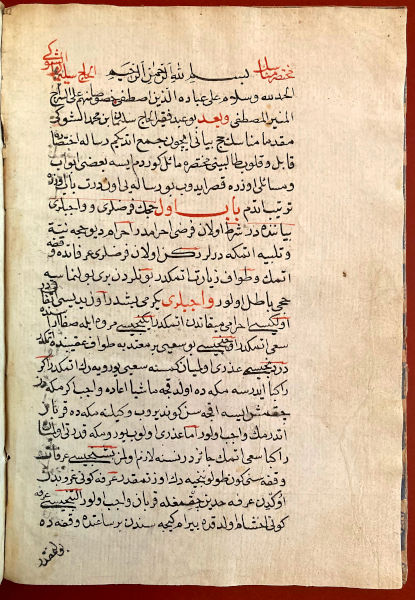
el-Ḥācc Şevkī Süleymām Meḥmed
Mukhtaṣar Manāsik
Elegant naskhī script in Ottoman Turkish without illumination.
Dated 1125 H / 1713 AD
37 leaves at 21 lines
22 x 15.5 cm
Carton binding
...
more »
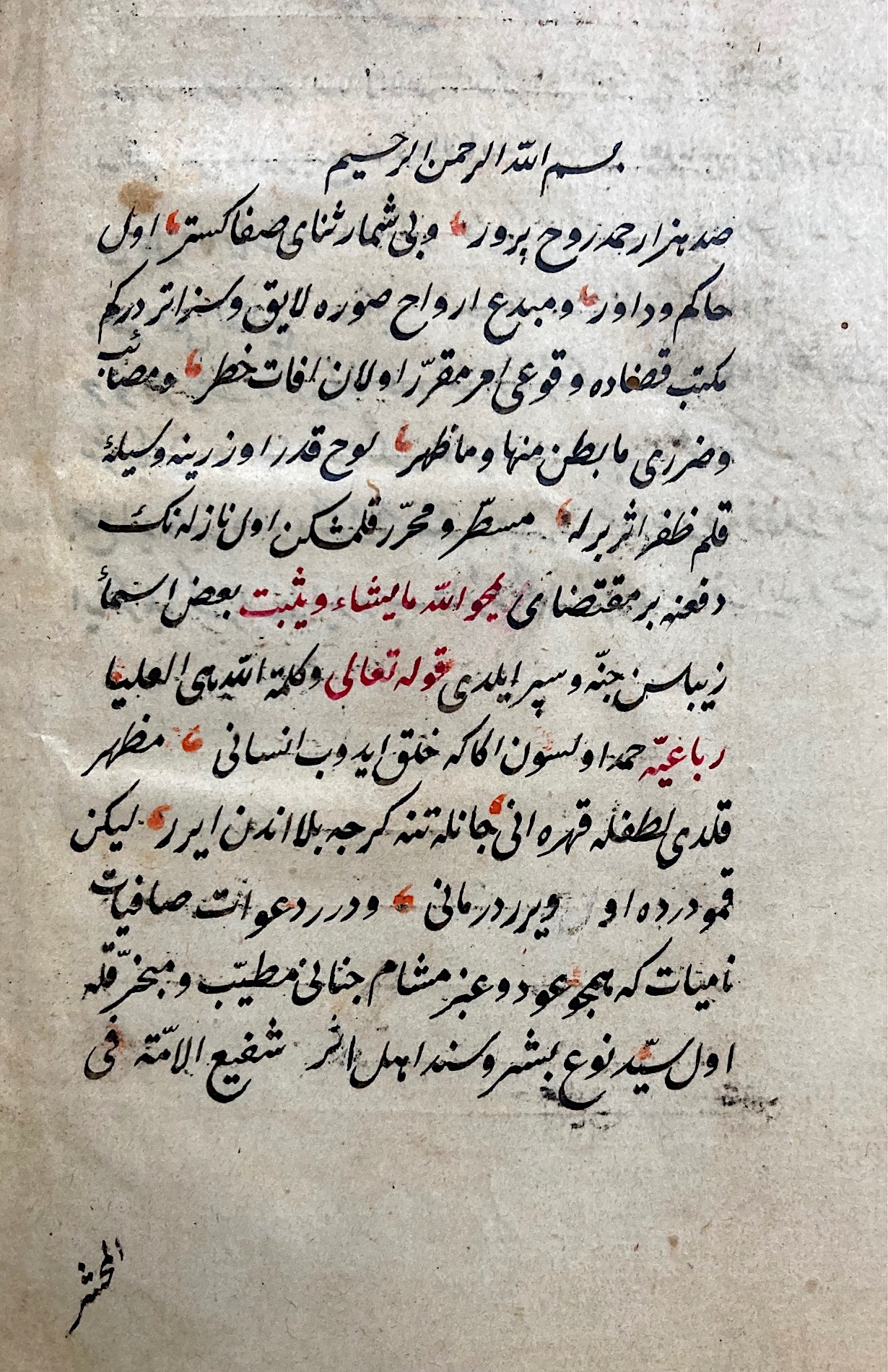
Yemenî Mahmud Efendi
Bahr-i Ali el-müşkülat-i külli kelimati aliyu müşkülat (Hymns of praise for Caliph Ali and his successors, the eleven Imams)
Manuscript in Ottoman Turkish
Copied by Yemenî Mahmud Efendi in Damascus in 1191 H [1777 AD].
94 pp. With 11 full-page havas illustrations , 16 x 12 cm.
Introductory note by the copist: "Al-hakir al-kadir; Mahmud Yemeni had the good fortune to get this copy from a saint when he was in Damascus. This saint had copied it from a manuscript in the treasury of Sultan Shah Mirza in the 841st year of the Hijra. No one who has authority at the highest level in our community is allowed to copy this manuscript." Numerology [number symbolism] is the assignment of meanings to individual numbers or combinations of numbers, whereby the numbers are given a symbolic function tha...
more »
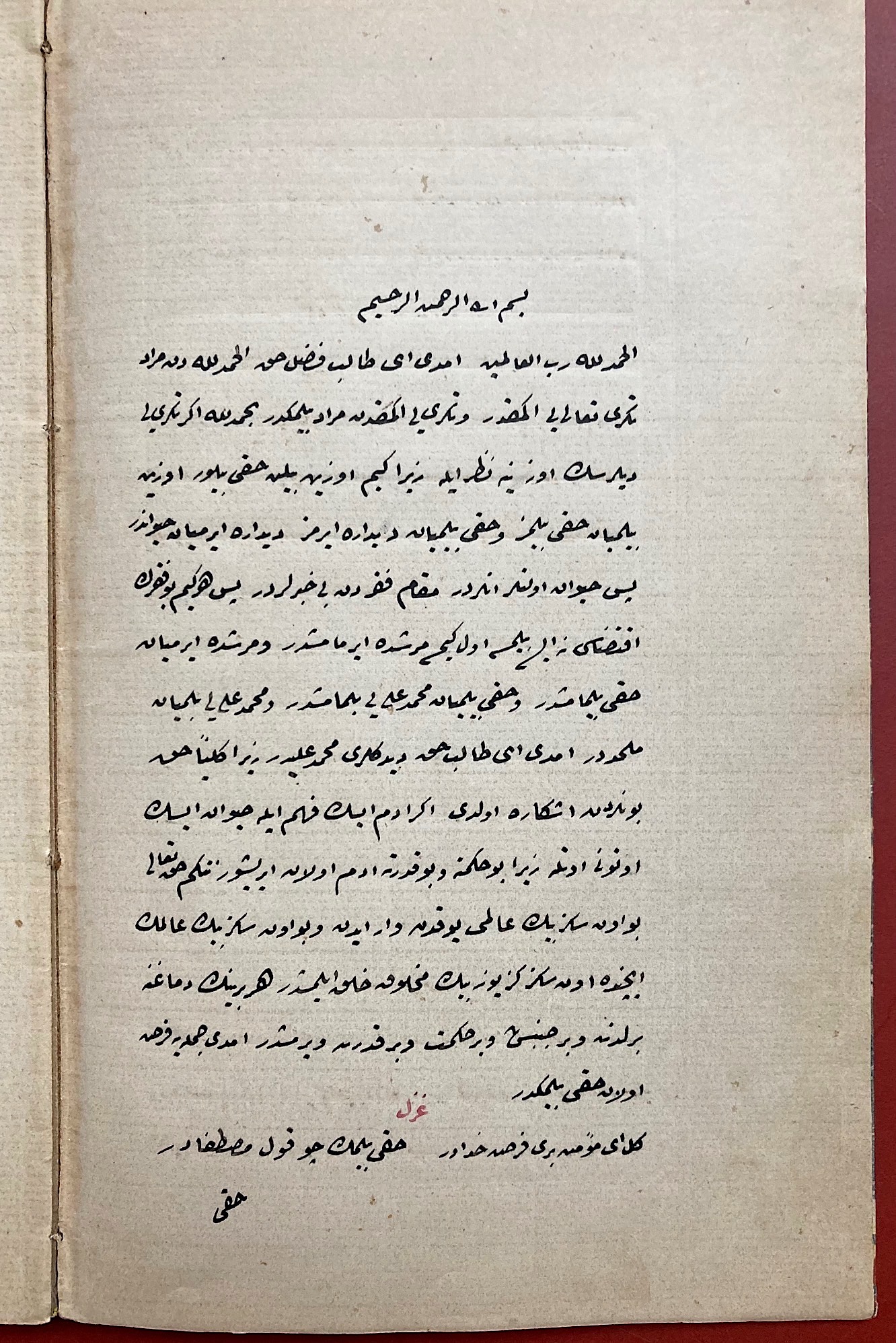
Viranî Baba
Kitab-ı Viranî Baba
Manuscript in Ottoman Turkish, copyist unknown, written 1217 H [1802 AD].
70 pages, 20 x 12 cm.
Marbled cardboard cover with leather spine.
Viranî Baba, an important figure of the Bektashi order, is considered one of the seven great poets of Sufism. He is a mystical poet who deals with the Bektashi teachings in his works. "Kitab-ı Viranî Baba" is one of Virani's most important works. It deals with topics such as religious and moral advice, the Prophet Muhammad, His Holiness Ali, the Twelve Imams and the love of Ahl al-Bayt. Hurufism is a belief system that assigns new meanings to numbers and letters. Many sources indicate that it has influenced Be...
more »
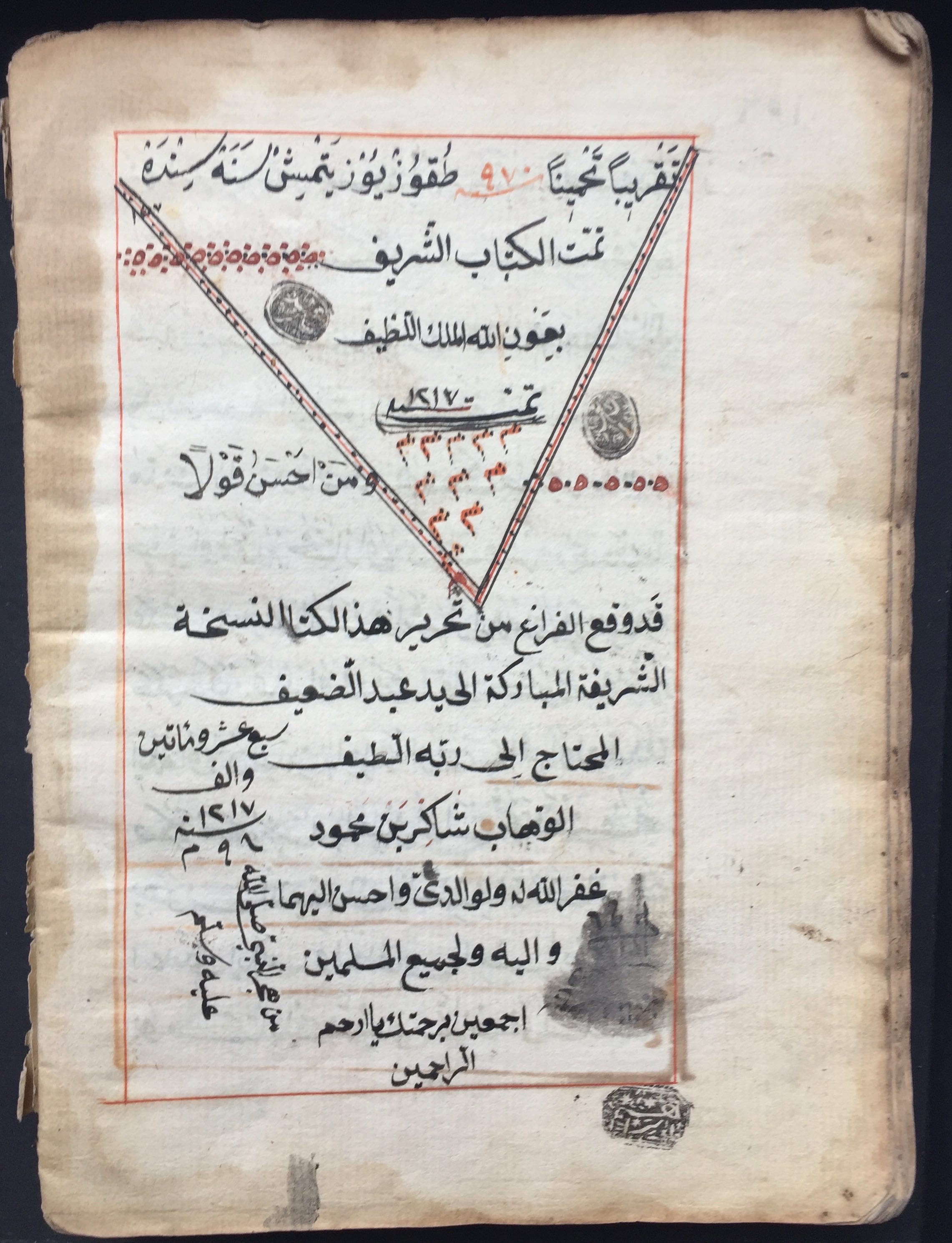
Muhammad Imam Birgivi, Şeyh ‘Aliyyü’s-Sadrî el-Konevî
1) Vasiyetnâme – The Last Will and Testament of Imam Birgivi; and 2) Şeyh ‘Aliyyü’s-Sadrî el-Konevî's commentary on Birgivi's Testament
Two Manuscripts in Ottoman Turkish
(1) Copied by Sakir bin Mahmud, 1217 [1802]
156 leaves, 21 x 15 cm
and
(2) Copied by Ahmed es-Sehid Tahir Hac Mehmed Efendizade, 1133 [1720]
200 leaves, 20 x 13 cm.
ad 1: Muḥammad Imam Birgivi who lived 928 - 980 [27 March 1522 – 15 March 1573] was a Muslim scholar and moralist who lived during the height of the Ottoman Empire and whose texts are used to this day as manuals of spiritual practice throughout the Muslim world. His full name, in Arabic, is Taqī al-Dīn Muḥammad Ibn Pīr ʿAlī al-Birkawī. Born Muḥammad ibn Pīr ʿAlī, in Balikesir, Ottoman Empire, in 1522, Mu ammad was sent to the capital Istanbul to study theology as a young man. He studied law under the chief military judge (ka...
more »
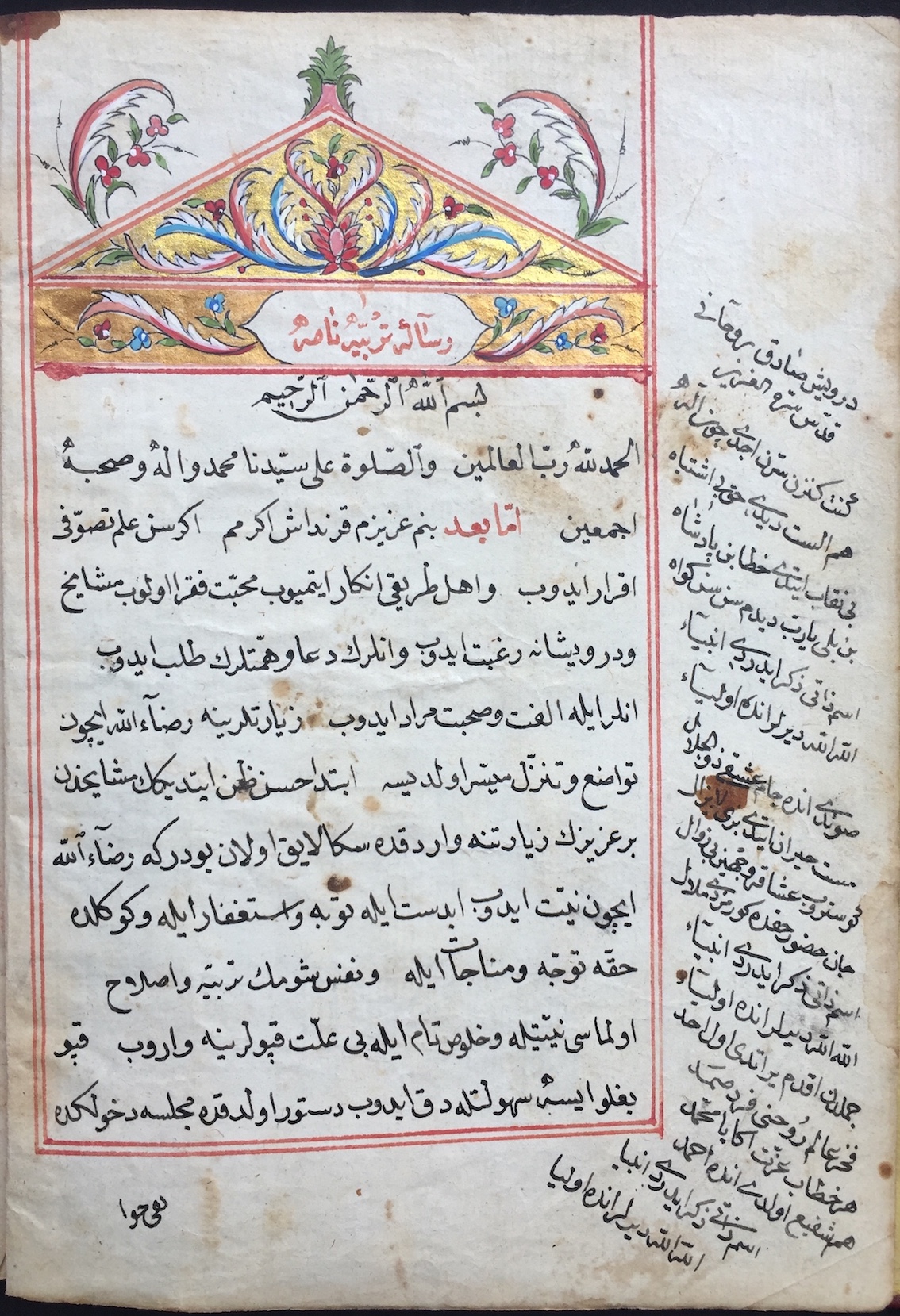
Mehmed Sâdık Erzincânî, 1136 - 1209 [1723 - 1794]
Four Risales and a Letter of Dedication
Manuscript in Ottoman Turkish
4 Risales in 1 Vol. , 27 + 57 + 58 + 19 + 2 = 153 pp.,
19 x 14 cm.
Mehmed Sâdık Erzincânî, also named Muḥammad Ṣādiq al-Arzinǧāni Muftīzāda, Mehmed el-Erzincani, and Muḥammad Ṣādiq Ibn-ʿAbd-ar-Raḥīm al-Muftī. Author of four risales (small texts in the form of a treatise on principles, rules and secrets of the Naqshibendi order. At the end a dedication in the form of a letter to his dervish colleague Mustafa, signed Fukara Muhammad Sadık Erzurumî Derviş Sâdık Erzincânî, 1185 [1771]. 1. Risâle-i Terbiyenâme. Author's copy, dated 1185 [1771], 27 pp. A treatise on Sufi customs, traditions ...
more »
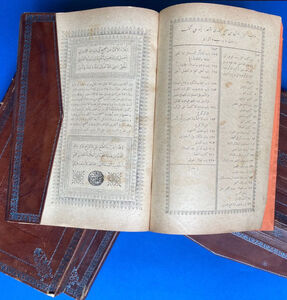
Muḥammad ibn Ismāʿīl al-Buchārī
Sahīh al-Buchārī
Printed in Arabic
Istanbul: Matbaa-i Amire 1315 H. [1897]
8 vols. bound in 4 vols. 228, 260, 3235, 270, 242, 253, 240, 219 pp.
24.5 x 18 cm, Ottoman Style full leather bound with flip
Sahīh al-Buchārī is the common name of a collection of hadiths that goes back to the Islamic scholar Muḥammad ibn Ismāʿīl al-Buchārī (d. 870). The correct title of the work is al-Jāmiʿ as-sahīh / al-Ǧāmiʿ aṣ-ṣaḥīḥ /'The Comprehensive Healthy'. The work ranks first among the canonical six hadith collections and is held in the highest esteem in Sunni Islam to this day. In terms of its authority and sanctity, it stands here directly behind the Qur'an. The first publication of Bukhārī’s al-Jāmi‘ al-sahīh in the ...
more »



